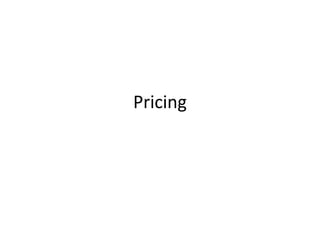9 price
- 1. Pricing
- 2. What Is a Price? • Narrow Definition: The amount of money charged or paid for a product or service. • Broad Definition: The sum of all values consumers exchange for the product or service. – Time Costs – Cognitive and Emotional Costs – Transaction Costs
- 3. Internal and External Factors Affect Prices
- 4. • Company and Product Costs: – Fixed Costs: • Costs that do not vary with production or sales level. – Variable Costs: • Costs that vary directly with the level of production. Internal Factors Affecting Pricing Decisions
- 5. • Marketing Mix Strategy: – Price must be coordinated with the other three P’s (Product, Promotion and Place) to form a consistent and effective marketing program. Internal Factors Affecting Pricing Decisions
- 6. • The Market and Demand: – Costs set price floors; demand sets price ceilings. – Supply and Demand Curves – Pricing in different types of markets: • Pure competition • Monopolistic competition • Oligopolistic competition • Pure monopoly – Price elasticity of demand. – Cross price elasticity of demand. External Factors Affecting Pricing Decisions
- 7. External Factors Affecting Pricing Decisions • Competition’s Prices Affect Our Price – What are our competitors charging? How and Why? – Will our pricing attract, restrict, or drive out competitors? – How does our value compare to the competition’s? – How strong/permanent are current competitors? – How does competition influence price sensitivity? – Avoiding price wars • Other External Factors – Economy • Inflation • Purchasing Power • Business Cycle (Boom, Recession, Depression) • Counter-cyclical products







